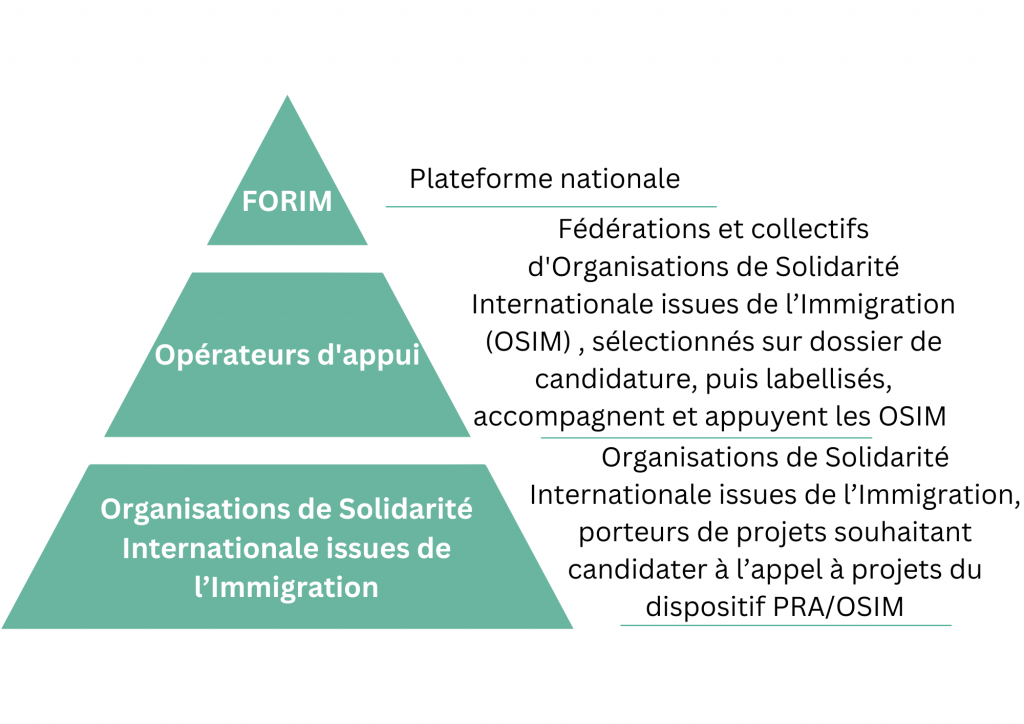
Six months into the partnership with FORIM (Forum des Organisations de Solidarité Internationale issues des Migrations) to strengthen the capacities of diaspora networks in France, Project Officer Hala Tarabay shares her top takeaways from the three training workshops carried out so far…
Introducing FORIM
Established in France in 2002, FORIM manages a unique structure whereby diaspora networks support diaspora organisations by accompanying project design and implementation in countries of origin, promoting cascade learning and peer exchanges. With the support of diaspora networks (or FORIM’s accredited support operators), individual diaspora organisations in France can apply for financing for micro-projects to be carried out in the countries of origin through FORIM’s PRA/OSIM programme (Programme d’Appui aux projets des Organisations de Solidarité Internationale issues de l’Immigration).


Three topics and counting…
The EUDiF–FORIM partnership seeks to upskill diaspora networks through targeted training, the modules of which were selected based on a needs assessment carried out in July and August 2022. Various workshops took place since to train 40 representatives of diaspora networks under the following topics:
- Management and accompaniment of projects
- Better adaptation to management of public funds
- Communication
Workshop materials include trainers’ notes so that support operators can use them when accompanying diaspora organisations in the future.
Top takeaways
The workshops and materials are tailored for support operators accompanying FORIM’s organisations, but the top lines are relevant to all diaspora networks and organisations active in development, and their partners.
From across the different sessions, here are the key messages we gathered:
Adult to adult accompaniment: facilitation, not instruction
The uniqueness of FORIM’s scheme lies in sharing of experiences between diaspora structures. However, teaching adult learners (or andragogy) is not a straightforward task. In order to be more conducive to learning, accompaniment and coaching approaches with adults should be adapted depending on the diaspora organisation in question, the theme and the objectives of the exchange. In this regard, we have learnt the need to define the position and the tools an accompanier should adopt when coaching another diaspora member. As a rule, the adult educator must start from the experience of the learners and position himself or herself not as a “knower”, but as a facilitator.
“These trainings allowed me to better understand how to manage the diaspora network-diaspora organisation relationship, and how to accompany an organisation within the framework of a project.” Participant, support operator
Prioritise financial risk assessment
Fundraising and fund management is a top priority for project implementation that is given little attention, and often too late. Being able to budget forecast and understanding donor language are crucial elements for success. If an organisation is able to identify and anticipate potential project pitfalls, it can create tailored solutions to reduce financial risks and be in a better position to receive and manage public funds.
To assess risks, variables to keep in mind are:
- Stability of the country of implementation,
- Reliability of local partners,
- Complexity of the project design,
- Operational and financial history of the organisation,
- Solidity of the equity capital invested by the diaspora organisation,
- Diversification and securing of financial resources,
- Proper financial reporting and supporting documents.
“Anticipation, rigor and vigilance from the start!” Mireille Jallet, trainer
“This knowledge will help my network prepare budgets with serenity and care for the next submission of project proposals under the PRA/OSIM.” Participant, support operator
The three Cs of communication
Clear, consistent and concise came out as the three key words on communication. External communication is vital to raise awareness of the impact of diaspora development work. Equally, the three Cs apply for internal communication within an organisation and with its governance bodies, including funders. By ensuring all internal and external communication tools such as power point presentations, newsletters and photos and videos, follow this mantra, an organisation can deliver convincing and contextualised messages, which will help build identity, grow their networks and – crucially – build trust.
If these lessons struck a note with you, contact us to know more about past and upcoming trainings and activities under EUDiF’s action with FORIM at eu-diaspora@icmpd.org.
Our collaboration with FORIM will continue in 2023 with additional training for the support operators. For more on the action, read the info sheet.